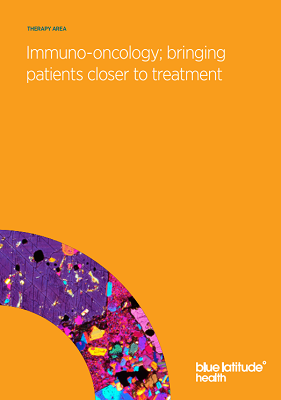Immuno-oncology; bringing patients closer to treatment
August 18, 2016 | HCP, Treatment, immuno-oncology, immunotherapy, stakeholders
What do the new immunotherapies in oncology mean for those stakeholders who need to understand and make decisions about treatment?
By offering a novel way in which to fight cancer through harnessing the patient’s own immune system, extending survival, reducing toxic side-effects, and offering the possibility of a functional cure; immunotherapies offer positive news for all stakeholders involved in the fight against cancer.
What do these scientific leaps mean for those stakeholders who need to understand and make decisions about immunotherapies? Even more importantly, what do immunotherapies mean for patients who face diagnosis of advanced cancers?
Senior Associate Consultants Frances Hendry and Zoe Bartley tackle these complex questions.
Multi-stakeholder immuno-oncology experience
Blue Latitude Health has worked across a number of immunotherapies in melanoma, lung cancer, myeloma and acute lymphoblastic leukaemia. Our work to date has focused on primary research with Nurses, Oncologists, Pulmonologists, Haematologists, Pharmacists and Payers. With the insights generated from this research, we have developed a greater understanding of our stakeholders within immuno-oncology, their evolving challenges, and the impact those challenges have on patient outcomes.
Immunotherapies for a lucky few; are your stars aligned?
Immuno-oncology (IO) is such an exciting area, especially for a patient. There’s been significant media coverage on the development of IO, on the so-called “super-patients,” and the possible outcomes that can be achieved; predominantly the potential of significant increases in overall survival (OS) coupled with manageable side-effects; something of a novelty for patients receiving cancer treatment. For these outcomes to become a reality, all the relevant parties need to work together, removing barriers to ensure that this is not an outlook restricted to a lucky few. What do these lucky few currently look like? And how can they become the majority?
To begin with, the lucky few must have a type of cancer for which immunotherapies are currently indicated. Immunotherapies can treat head, neck, lung, prostate, renal, multiple myeloma, AML, ALL and kidney cancer. However, having one of these types of cancers does not present a guarantee that patients can be treated with one of these transformative products, instead it is only a very niche patient population that qualifies for their use and even then, predicting who will respond to treatments remains a key challenge.
The physician treating the patient, and the hospital in which they are based have a significant impact on availability of immunotherapies. What happens if a patient doesn’t live close to a central hospital that has access to the drug? Or worse still, where their physician doesn’t yet have a full working knowledge of the drug? Will such a physician stray from their regular working practices and advocate that a new form of therapy be secured on hospital formulary?

Download the full article from Blue Latitude Health
This content was provided by Blue Latitude Health




